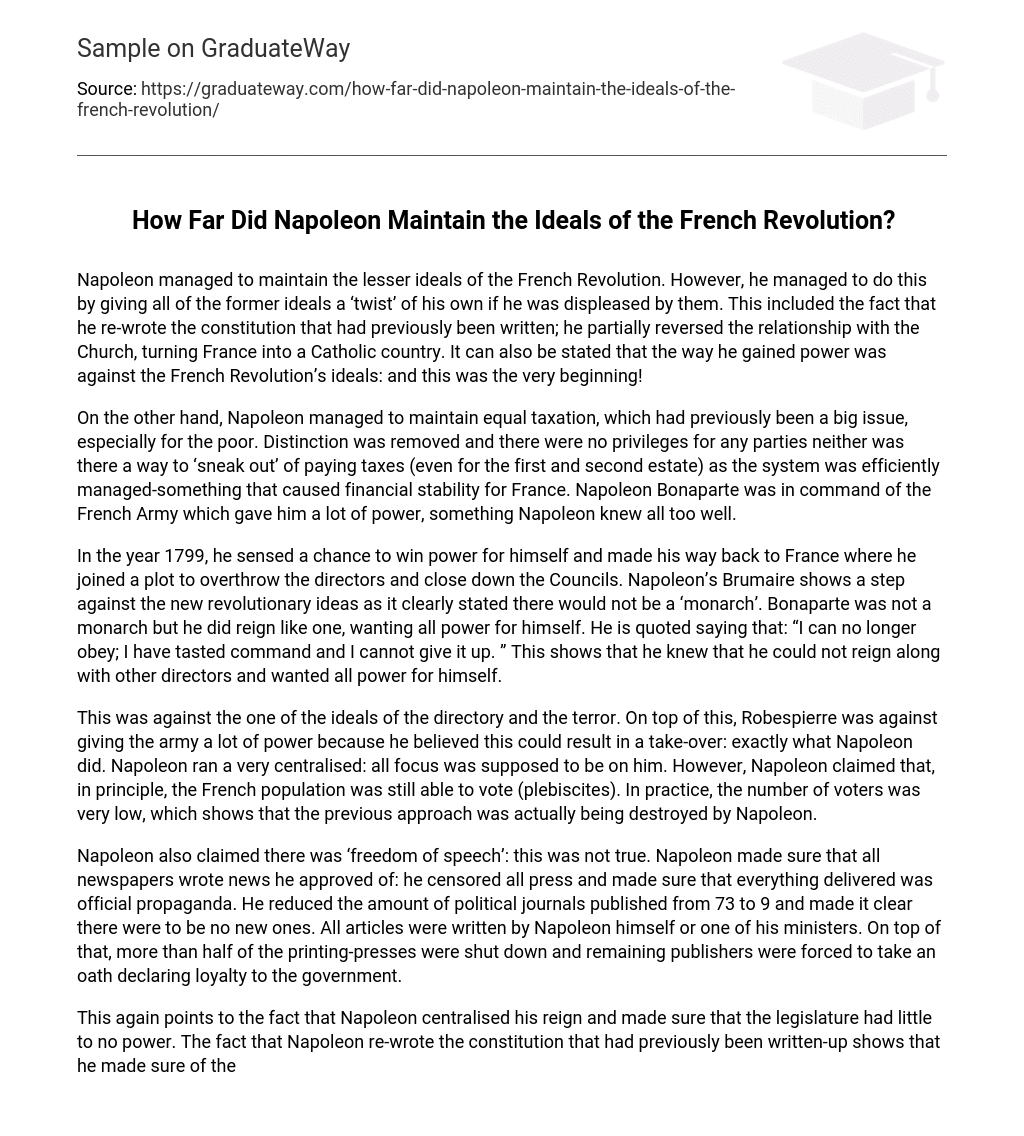Napoleon, despite his ability to uphold the fundamental principles of the French Revolution, skillfully infused his own modifications to those ideals when he found them unsatisfactory. Notably, he revisited and revised the previously established constitution, in addition to altering the dynamics between the state and the Church, ultimately establishing France as a predominantly Catholic nation. It is also noteworthy that his ascent to power defied the very essence of the French Revolution, marking the start of a contradictory path.
Despite the previous concern among the poor about unequal taxation, Napoleon successfully implemented equal taxation, eliminating distinctions and privileges for all parties. This efficient management of the tax system brought financial stability to France. As the commander of the French Army, Napoleon held significant power and was keenly aware of it.
In 1799, Napoleon saw an opportunity to seize power and returned to France. He became involved in a plot to overthrow the directors and dissolve the Councils. Despite claiming he would not become a monarch, Napoleon ruled with absolute power. In his own words, “I can no longer obey; I have tasted command and I cannot give it up.” This demonstrates his desire for complete control and inability to share power with others.
This went against one of the ideals of the directory and the terror. Additionally, Robespierre opposed granting the army excessive power as he feared it could lead to a takeover, similar to what Napoleon eventually did. Napoleon implemented a highly centralized system, where all attention was directed towards him. Nevertheless, Napoleon argued that, in theory, the French population still had the ability to vote through plebiscites. However, in reality, the number of voters was very limited, indicating that Napoleon was effectively undermining the previous approach.
Napoleon deceived people by declaring that there was a ‘freedom of speech’ in place, even though it was far from the truth. He exerted strict control over the media, ensuring that all newspapers strictly adhered to his approved news content. By implementing censorship, he effectively transformed the press into a tool of official propaganda. His actions included drastically reducing the number of political journals from 73 to 9 and prohibiting the creation of new ones. The articles published were either authored by Napoleon himself or one of his ministers. Additionally, he closed down more than half of the printing-presses and forced the remaining publishers to swear an oath of loyalty to the government.
The text highlights Napoleon’s authoritarian rule and his efforts to diminish the power of the legislature. By rewriting the constitution, Napoleon ensured that he held all power, leading some to believe that the French Revolution was over. However, he did incorporate elements of the previous constitution, including the principle of equality for all citizens. Despite proclaiming equal opportunities, ordinary people were neglected in terms of education, similar to the previous regime. Additionally, Napoleon did not prioritize education for girls, as their future was seen as being solely focused on marriage.
One of Napoleon’s most well-known quotes is: “women are nothing but machines for producing children.” He ensured that all ‘privileges’ were abolished and maintained equal taxation, which had been established by previous leaders. Additionally, he eliminated the division between social classes. However, a negative aspect was the reintroduction of Lettres de Cachet, which violated the principle of equality by depriving individuals of their right to a fair court hearing or trial.
Napoleon sought to rebuild his relationship with the church, despite his indifference towards religion. He recognized its potential to maintain social order and prevent class conflict. In order to solidify his power, he compelled the Church to sign the Concordat, granting him full authority over French bishops while also tightening state supervision over the Clergy’s activities. Napoleon’s motivation for pursuing this arrangement stemmed from his personal ambitions, as he openly declared.
He embraced the ideals of the French Revolution and expanded upon previous principles. The disillusioned French population readily accepted Napoleon as their leader due to their immense suffering. However, once Napoleon recognized his unchecked power, he went beyond boundaries by declaring himself emperor. These aforementioned points provide undeniable proof that Napoleon deviated from the revolutionary ideals. He prioritized his personal desires and ensured their fulfillment by modifying, adapting, or establishing his own ideas.





